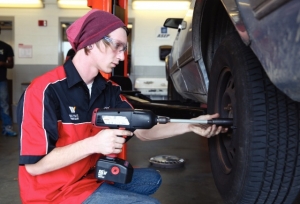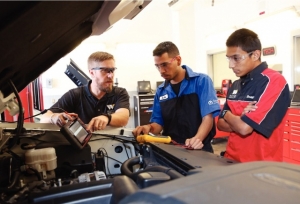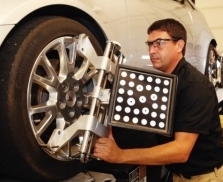Leading the field
By Phyllis Moore
Published in News on September 27, 2015 1:50 AM

News-Argus/MELISSA KEY
Mikey Howell, automotive student at Wayne Community College, works to align tires during class on Thursday afternoon. WCC was recently selected as one of 11 in the nation to provide training for Chrysler technicians, and students are already seeing that incorporated into the program.

News-Argus/MELISSA KEY
Craig Foucht, left, Wayne Community College automotive department chair, demonstrates for students Luis Anguiano and Victor Ortiz how to use a diagnostic tool to check the module communication during class on Thursday.

News-Argus/MELISSA KEY
Kevin Jordan, local coordinator of the Career Automotive Program, or CAP, at Wayne Community College, demonstrates how to align suspension during class on Thursday.
Wayne Community College has been chosen as one of 11 community colleges in the country to provide training for Chrysler technicians.
FCA US, or the Fiat Chrysler Automobiles family of companies, and NC3, National Coalition of Certification Centers, made it official by visiting the college recently to orient dealership personnel on the Mopar CAP, or Career Automotive Program.
The NC3 group of schools across the nation collaborate with institutions like Wayne Community for two reasons -- to replicate the training and help schools become better, said Craig Foucht, automotive department chair at WCC.
"One of the things that they do as a non-profit organization is look for partnering organizations. Fiat Chrysler automobiles ended up being one of those," he said. "Then, they approached 10 schools after they piloted in (Wisconsin). They approached 10 schools across the nation that were their leadership schools, WCC being one of them."
The company then made contact with Ben Skillings, parts and service director for Classic Chrysler, who is also on the advisory council for the automotive program and its lead dealership representative.
"I was contacted by Fiat Chrysler and asked what I thought of the program," he said. "Well, I have four of their students working for me right now. ... I've been involved in education for many, many years. It's a great program. I back it 100 percent, and I just informed Chrysler, I don't think we can do any better."
Skillings said having WCC offer the training will be an asset to the local community.
Kevin Jordan, program coordinator, said the courses are online so they are easily incorporated into the current curriculum.
Other perks from the affiliation include access to service information and a WiTech scan tool -- a new level of scan tool that can be plugged into the vehicle on any laptop or mobile device.
But the biggest benefit will be felt by the students.
"It's just another avenue to seek employment," Jordan said. "They'll graduate our program with the same thing they normally would. It's a two-year associate's degree in applied science automotive technology degree, but they'll also have certifications."
The automotive program currently includes 40 students, with the automotive systems technology/multiple manufacturing program, or ATEP, capped off at 18, Jordan said.
Students are not required to work outside of attending classes, although there is a co-op work placement option.
With the additional Chrysler training, it can translate into advantages for both the students and businesses willing to employ them.
"I can provide them with a student that's Level 1 certified that, while he's working in his shop, there's a stipulation that as long as they're in school, (students) have an 18-month grace period they can start doing Level 2 warranty work, so they begin doing a level higher than what they're currently training because they're at this institution and participating in that Chrysler training," Jordan said.
Skillings said in his lengthy experience in the business, there has always been a shortage of technicians. And while he can't hire all of them, he says he works with other dealers and tries to put students to work.
Some of his efforts these days are in making high school students aware of the program and then finding them jobs when they're finished -- allowing WCC to handle the "in-between part," he said.
"As I always tell people, the high school programs that are out there, they're like putting in the concrete floors," he said. "What they do here (at WCC) is put up the walls, they put on the roof, they seal the house up. After that, when they come to me, then my job's the sheetrock, wiring, I finish everything. And that's a never-ending process.
"I tell students all the time, do not plan on your education stopping. You'll train for this for the rest of your life if you're in this industry. That's just the nature of the business."
Jordan and Foucht take pride in their students, noting that the placement rate after graduation is impressively high -- and not necessarily all in the transportation industry.
"The thing that happens is that these students, when they come through, they learn skills that are applicable across multiple industries," Foucht said. "So we have a graduate that's currently working for a forklift company. We've got another graduate that, even though we've got a program that supports this, he works in maintenance at Carolina Turkeys.
"They learn some very transferable skills, but typically within industry about 90 percent of the students are going to stay in."
Another byproduct of the recent recognition will happen on Oct. 16, Foucht said, when the college will launch the next 10 schools from across the country named to the training program.
"Ultimately, I believe there will be 100 nationwide," he said. "We'll be the one that's serving eastern North Carolina."
